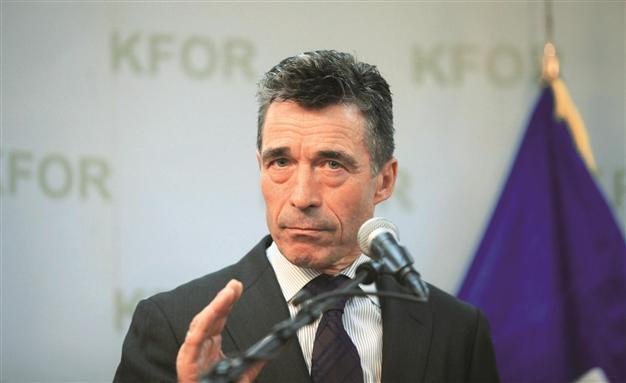NATO vows to assist Turkey on Syria border
GENEVA / WASHINGTON

Rasmussen said information from sources pointed to al-Assad being responsible for the use of chemicals. REUTERS Photo
The recent use of chemical weapons in Syria “cannot go unanswered,” NATO head Anders Fogh Rasmussen said yesterday, adding that the 28-member military alliance would continue to assist Turkey and protect the alliance’s south-eastern border.
“Information available from a wide variety of sources points to the Syrian regime as responsible for the use of chemical weapons in these attacks,” Rasmussen said in a statement after a meeting of NATO ambassadors in regard to the Aug. 21 chemical attack in the Damascus suburb of Ghouta. “We condemn in the strongest possible terms these outrageous attacks, which caused major loss of life. … This is a clear breach of long-standing international norms and practice. Any use of such weapons is unacceptable and cannot go unanswered. Those responsible must be held accountable,” he said. “We will continue to consult and keep the situation in Syria under close review, and NATO continues to assist Turkey and protect the alliance’s south-eastern border.”
International envoy to Syria Lakhdar Brahimi confirmed yesterday that chemical “substances” were used in the attacks as the U.S. and Britain ruled out any military effort to oust President Bashar al-Assad from power.
“It does seem some kind of substance was used that killed a lot of people,” said the U.N. and Arab League envoy, adding that he was awaiting evidence from Western powers as well as U.N. inspectors currently visiting the sites. U.N. chief Ban Ki-moon said inspectors needed four days to conclude their investigation and time to analyze the findings.
“In my mind, there is a before Aug. 21 and there is an after Aug. 21,” Brahimi said. But while he acknowledged that the attack was “of course unacceptable [and] outrageous,” he added: “How to react is another issue.”
The veteran diplomat said any U.S. military action in Syria would need to be approved by the United Nations Security Council. “I think international law is clear on this. International law says that military action must be taken after a decision by the Security Council. That is what international law says,” he told a news conference in Geneva.
“I must say that I do know that President [Barack] Obama and the American administration are not known to be trigger-happy. What they will decide I don’t know. But certainly international law is very clear – the Security Council has to be brought in,” Brahimi said.
In Moscow, Russian Deputy Foreign Minister Vladimir Titov said the U.N. Security Council should wait for inspectors to present their report on an alleged chemical weapons attack in Syria before considering a response.
The remark signaled Russian opposition to a plan by Britain to put a draft resolution to the council late yesterday authorizing “necessary measures” to protect Syrian civilians. “It would be premature, at the least, to discuss any Security Council reaction until the U.N. inspectors working in Syria present their report,” Russian news agency Interfax quoted Titov as saying.
Unity call from Ban“We’ve always said we want the U.N. Security Council to live up to its responsibilities on Syria. Today they have an opportunity to do that,” Cameron said in an earlier statement. “The draft resolution would condemn the chemical weapons attack by al-Assad.”
Ban called on a divided U.N. Security Council to unite and bring peace to Syria. “Syria is the biggest challenge of war and peace in the world today. The body entrusted with maintaining international peace and security cannot be missing in action,” Ban said, referring to the Security Council.
In Washington, a U.S. official said yesterday they had ruled out unilateral military action against Syria and was conferring with allies on potential punitive strikes that could last for more than a day. “Any military action would not be unilateral. It would include international partners,” the senior administration official, who spoke on condition of anonymity, told reporters.
A day before Washington and London insisted their goal was not regime change but to punish al-Assad’s government for unleashing chemical warfare on civilians. The White House said any U.S. action would be to defend the principle that chemical weapons should not be used and would not aim to topple the government, despite previous calls for him to go. “I want to make clear that the options that we are considering are not about regime change,” said Obama’s spokesman, Jay Carney. British Deputy Prime Minister Nick Clegg also denied that the aim would be to topple the regime of President Bashar al-Assad. “What we’re not considering is regime change, trying to topple the al-Assad regime, trying to settle the civil war in Syria one way or another.”
